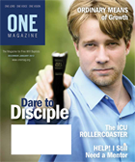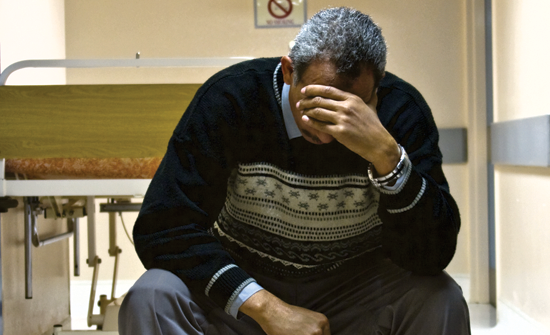
December-
January 2012
Dare to Disciple
----------------------
|

Seats in an intensive care unit waiting room should have seatbelts, because sometimes, the ICU waiting room feels like a rollercoaster.
The ICU Rollercoaster
By Jeff Nichols
My family and I recently endured 18 days in the ICU waiting room in my hometown in Mississippi while my brother battled complications from lung cancer surgery. The lessons learned and moments lived will stick in my mind for a very long time.
Life turns into a rollercoaster in an intensive care unit waiting room. Every four hours, you get to see your family member or friend. Will it be good news? Bad news? Did the doctor say respirator or ventilator? What is ARDS? Do I need to decide something today? How do those nurses do it? Only four more hours before I get to see them again!
How many people have sat in those uncomfortable chairs enduring the same wide range of emotions? How many have been called back to receive “the news”? How many hugs, cries, screams, sobs, and snores have filled that room.
Families are contained in close quarters for indefinite periods—sleeping, crying, watching, waiting. Waiting for news. Waiting for hope. Being visited by people living their normal lives before they come in, who step into the whirlwind of the roller coaster for a short while before stepping back out into the calm breezes of routine.

Using the rollercoaster analogy, here are some things to remember when your turn comes to ride the ICU waiting room roller coaster:
You are not alone. On the rollercoaster, you are linked together with quite a few other people. Some you may know. Most you don’t. Some have ridden this ride before. Others are rookies. But you are linked together, whether you like it or not.
Some have been on the ride for weeks—the veterans. Others just started—the rookies. No one really knows how long it will last. Only that it is filled with ups and downs. So get to know your fellow riders. God may have a purpose for your “adventure” together.
There will be sudden drops, twists, and turns and some will turn you upside down. Twists and turns make a rollercoaster an adventure, but they are not so much fun in the waiting room. But twists and turns are reality. Some of them will turn you upside down…and inside out. At 2:00 a.m. his vital signs were good, and everything looked stable. At 6:00 a.m. he has developed blood clots in his legs cutting off blood flow to his legs and feet. Did they say amputation?
It’s hard to see the bottom of the drop. The first big drop, the one that gives the coaster car the momentum for the rest of the ride, is a doozey. When you drop down that hill at breakneck speed it’s hard to see the bottom of the hill. When a loved one is in medical freefall with unexpected complications popping up daily or hourly, it’s hard to envision when, or how, it will stop. When will it level out? And when it does, there may be another hill to climb with a drop waiting on the other side.
People who are pregnant, people with back injuries or heart conditions should not ride. No one in a fragile medical condition should ride a rollercoaster. Period. But a rollercoaster has nothing on the ICU waiting room. The ICU rollercoaster is not for the faint of heart. Some can’t handle it—much less visit the patient. Don’t judge them. Not everyone is equipped for the ride.
Keep hands and feet inside the cart at all times. Pull your shoulder harness down securely around your shoulders. You must follow the rules of the ICU. Before visiting your patient, turn off cell phones. Wash your hands before and after your visit. No more than two visitors per patient. You may not see the need for these rules, but in the end, it’s for the health of your loved one (or you). Don’t give the nurses and other hospital staff members a hard time. Understand that they are doing their best to help your loved one.
Employees look so comfortable and relaxed around such hysteria. Have you ever seen the faces of roller coaster attendees? They look bored. What seems thrilling to you has become old news to them. They have seen it all a thousand times. It’s just another ride.
Nurses, doctors, technicians and other personnel who work in the ICU are special people who feel comfortable in such an environment. They instinctively know what to do in crisis situations. They work 12-hour shifts and remain just as sharp at hour eleven as they were in hour one. They are exceptional.
Ministers also stick out on this ride—not because of the way they dress but how they carry themselves and the peace they bring with them. They bring a calm, assuring presence to the room because they are comfortable here. And they may be the only one. They are in the waiting room because they want to be. They’ve ridden the ride many times with many families. They know the possible outcomes. They are available to warn, comfort, listen, counsel, pray, and just be there.
After the ride comes to a complete stop, push up your shoulder harness and make your way to the exit. No one wants to take the ICU rollercoaster ride, yet most people find themselves on it when least expected. Are you ready? And if you find yourself on the ride unexpectedly, remember that it did not take God off-guard. Psalm 139:16 tells us, “All the days ordained for me were written in your book before one of them came to be.” The ride will end one day, one way or another. He knows. He is there, and He will be waiting for you.
About the Writer: Jeff Nichols is executive pastor at Donelson Free Will Baptist Church in Nashville, TN.
|
|

